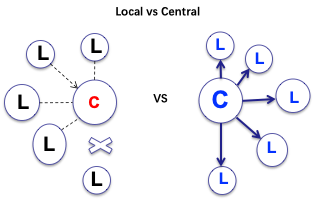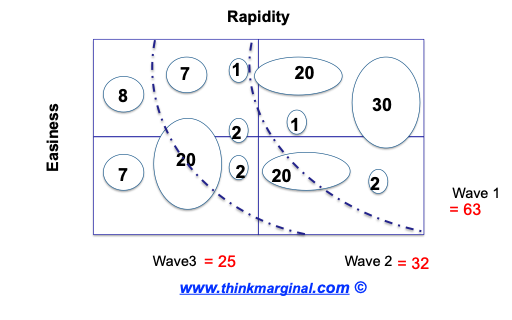10 golden rules for managing a central purchasing office in a decentralized organization
- BOEDEC

- Apr 6, 2022
- 11 min read
Updated: Apr 13, 2022
Written by Patrick Boëdec, March 30th, 2022

In the field of purchasing, there are two opposing organizational principles: centralized and decentralized. In the first case, the "Purchasing" function is favored since the buyers decide on the supplier panel "in consultation, of course, with the operational staff".
In the second case, purchasing is done at the local level, often with central "purchasing" coordination for certain expenses.

If we consider the fact that massification is the first lever for improvement in purchasing, it is clear that managing a central purchasing unit in a decentralized environment is much more complex, since the negotiation point is ultimately the responsibility of the local authority.
To better understand the issues, it is necessary to understand the two organizational logics:
- In a centralized organization, managers believe that optimizing and professionalizing the so-called "support" functions generates more financial results than a possible lack of motivation linked to a "functionarization" of operational staff.
- In a decentralized structure, on the other hand, shareholders consider that giving the local manager all the "attributes of power", i.e. all the levers acting on the profitability of the entity; purchasing, logistics, accounting, HR, sales, etc., has more impact on financial performance than the potential gains from centralizing these "support" functions.
Often in this type of organization, the operational people constitute a form of "aristocracy", respected in the company, because they manage the company's activities or subsidiaries from start to finish. It must also be admitted that these bosses are also "high potentials" recognized for their skills.
The "Purchasing" director, on the other hand, is considered a "functional" person. He does not have the same credibility and even less authority over the "operational" people. This is all the truer if his hierarchical level is "lower" than that of the entity managers.
"It is vain imposing assistance on local operational staff, if they do not recognize the added value you could provide to them, the desire for autonomy takes precedence above all."
The level of reporting line is undoubtedly a strong indication of the importance that shareholders attach to the "Purchasing" function and its contribution to the company's financial performance. For example, a purchasing director reporting to a CFO reflects the strategic disinterest of this function; otherwise, he would have reported directly to the CEO.
In the course of my work, I have often observed purchasing directors, when they are recruited, being given the imperative task of restoring discipline with a very determined discourse from top management. The first time a purchasing manager takes the initiative to pool or rationalize resources, leading to a reduction in the subsidiary's autonomy, he or she generally encounters hostility from local operational staff. To bring their projects to fruition, they have no other solution than to go back upstairs and seek arbitration from their management, to force the operational staff to validate their recommendations... By this time, it is too late, the damage has already been done, and credibility is like a "skin in the game" (referring to Balzac's novel), it cannot be restored.
Experience has taught me that there is always a difference between the mission statement: "Align" and the authority that management is willing to exercise.
Be careful with all the "suicide" missions that are given to you "from above", because when tensions are created, there is a good chance that the principals are "absent". But everyone knows that promises are only binding on those who believe them. In the past, I have deplored the departure of several purchasing managers, who were rejected for having "clumsily" carried out the instructions they had been given, in particular one, who was brilliant, at a specialist retailer, who had nevertheless spent 10 years advising him, before going to the other side of the fence and trying to impose referencing and pooling of resources on store managers. It is useless to try to cross a minefield with yellow flippers...
So, the question is how to find our place to contribute effectively to a decentralized system?
In this type of structure, except for a few families for which he or she is responsible, the purchasing manager is a contributor, not a "doer", the art being exercised in local entities. The best way to play his role is to focus only on what gives results, and not to venture where no one expects you.
The concept of "Think marginal" recommends devoting a marginal effort to obtain a result that is much greater than the effort made. It is a question of widening one's field of understanding, one's reading of the managerial environment in a tactical way, by moving one's pawns in an orderly and systematic way. In short, to see further than your interlocutors, to better make them converge towards your own objective, to bring them to take the decisions that you have decided to make them take.
From my experience in restructuring a dozen purchasing centers, mostly in a decentralized environment, I propose 10 best practices to set up an intelligent and efficient governance, where each party will win.
1- Co-evaluate buyers annually with the local boss
It is utopia thinking controlling "procurement" in subsidiaries if local buyers remain hierarchically attached to local management. A central buying director will not have the necessary authority to consolidate, standardize, pool, because only entity's leader gives ultimately his directives to his buyers.
Obtaining the right to co-evaluate local purchasing managers can take time, from one structure to another, but keeping this as a "red guideline " as an objective, justifying it from the angle of the cohesion of "Purchasing" practice, and the improvement of the buying competence model, these imperatives will sooner or later impose itself, as good sense.
I have often been surprised at how easily, after some time, what was initially beyond the yellow line, can make its way to becoming an affordable topic. This is probably because this "citizenship surrender" for a branch manager is not as costly to concede.
In a group in the energy sector for example, It took a change in management for this previously taboo subject to be put back on the top of the agenda, the decision was taken in the moment almost as a managerial anomaly to be corrected. No branch manager went to the mat to oppose it... It is necessary to know sometimes to plant a small seed, to water it regularly, to obtain a pretty flower.
2- Focus on the sovereign
A Purchasing Manager is, above all, the guardian of the tables of the law, as such, he is the guarantor of the following actions:
1. Formalize and improve the "purchasing" process and the interfaces between the stakeholders, engineering, quality, methods, logistics, supply,
2. To animate the "Purchasing" channels,
3. To define the evolution of the SIHA, the structure of Knowledge Management, the architecture of the purchasing repository, and the tools for sharing experience between buyers,
4. Share best practices between subsidiaries and the state of the art on the market,
5. To carry out internal and external benchmarks,
6. Administer the SRM platform, if any,
7. Manage the Catalogues,
8. Negotiate certain "framework" contracts, BFA, budgets with national or strategic suppliers,
9. Define training needs,
10. Define the profile of the categories of buyers,
11. Formalize the evaluation process, write, and update job descriptions,
12. Edit and interpret dashboards, monitoring the performance of the sector, setting KPI's,
13. Obtain certifications and standards,
14. Organize "Purchasing Quality" audits, which can be an excellent "can opener" for entering subsidiaries,
15. Ensure the integrity of the supplier panel,
3- Put on the costume of the pragmatic facilitator
The purchasing director must consider himself as a margin contributor for the boss of the local entity. The ultimate goal is for the latter to recognize him as a catalyst that can help achieve his own goals. Thus, the purchasing manager will become his ally, even if he must understand that he will never belong to the local tribe. His role will be like that of a coach.
You don't have to make friends in all the entities, why not start by finding one or more allies among the bosses of subsidiaries in order to give credibility to your action and contribute to making money by helping its local buyers, i.e., those who are the most cooperative, the others will inevitably follow. On this point, you must be very pragmatic, and as mentioned, earlier only spend the energy necessary for a given result and certainly not to convince operational people who do not want it.
In short, seek to be recognized as an available, competent, non-binding resource, rather than being perceived as a virus, coming from headquarters, which would only generate useless epidermal reactions.
4 – Know how to be political
You must visit the entities to understand their specificities, their constraints, the level of professionalism, their expectations. Each local entity has different needs, your action must be adapted to the local situation, aligned with its current operational performance, the subsidiary's market data, their customers, their competitors, their profitability...
The goal is, of course, to find an entry point, a shared focus, but also to identify and calculate the benefits that the entity would gain from playing the "central" Purchasing Director card.
Among all the possible subjects, select those that are quick and easy to obtain to show that what you propose gives an immediate result.

"Find a way to become a piece in the local manager's personal political chessboard."
At the same time, map the political stakes of each entity's boss, who are generally in competition with each other. Identify what each has to gain or lose, from a personal point of view, understand their fears, their ambitions, the alliances within the network.
5- Make "friends", i.e. allies
Find a focus in the entities and accompany the operational staff to advance on their subjects, those that are considered important to them. Dedicate the time and means necessary to make your action profitable.

Based on the feedback, it will be enough to create "local heroes" and promote the method to other entities based on results obtained. It is useless to start with the most resistant, if the approach gives results, it will inevitably become widespread, and the latter will join the movement later.
I have seen a purchasing manager in a very large industrial company act in this way. After an observation phase, he and his team focused solely on the few bosses of "driving" subsidiaries, even if it meant openly abandoning the others. He called this strategy "crabbing".
Rather than trying to convince the recalcitrant ones with futile efforts, he praised the results of those who were cooperative with his management.
After a year, the first entities complained about being neglected and demanded more intervention from the central office.
Two years later, this director was co-evaluating the local purchasing directors with the entity managers and was now involved in the subsidiaries' purchasing activities to their great satisfaction.
6- Playing up competitiveness between subsidiaries
A good way of getting operational staff to focus on purchasing excellence is to use comparative dashboards between entities.
When the worst performers show results that fall short of expectations over the months, this will inevitably put them in an unpleasant situation with their superiors and other entity managers. After one or two quarters, they will be forced to become more conciliatory at the very least, so as not to be caught out of cooperativeness; it is always delicate, in a group, not to play collectively.
Local bosses are jealous of each other's performance, especially when they have power issues at stake. In this case, playing "self-love" can be a good lever. I knew a plant manager in the automotive industry who knew how to strike a chord with the plant managers, who were all competing on their indicators. He had a knack for pointing out underperformance from one month to the next and highlighting the shortfalls. Several times, subsidiary managers wanted to meet with him to ask for his help so they would not be singled out at every report.
7- Not feeling responsible for the outcome over which you do not hold "hands"
Do not feel that you have been given a divine mission to obtain, at all costs, a result for which you have no direct leverage.
When carrying out the purchasing map, it is advisable to remove expenses that are outside your scope of action. In a decentralized organization, the setting of "purchasing" objectives must remain the responsibility of the subsidiary, even if it is your responsibility to consolidate the figures. In the RACI you are an "Involved" "Actor". The "R" of responsible is the responsibility of the entity manager.
As long as the operational staff does not consider that "purchasing" is a serious lever to increase their profitability, it is useless to evangelize.
8- Make the operational staff face their responsibilities
Ne portez pas toute la misère du monde ! Le "singe" reste sur les épaules des opérationnels comme nous venons de l'écrire, ce sont les résultats de leur entité, pas celui d'un directeur achats en position de coordinateur.
Cette métaphore du singe, symbolisant les "problèmes" est issu d'un excellent article sur l'art de la délégation et du management écrit par deux sociologues William Onckey, jr et Donald L. Wass publié dans Harvard Business Review intitulé "Who's got the monkey".
En résumé, ne prenez pas un "singe" qui ne vous appartient pas, c'est la meilleure façon d'échouer et de braquer vos interlocuteurs. Ils sont maîtres de leurs résultats,
Apportez de la valeur, de la connaissance, de la perspective, mais souvenez-vous que la performance opérationnelle et profitabilité restent bien leur "singe" et non, le vôtre.
Alors, il suffit de jouer les résultats, surligner les différences de performance entre filiales, les relier à leur niveau de coopérativité et les positions progressivement évolueront.
9- "Prépositionner" les patrons de filiales
Don't carry all the misery of the world! The "monkey" remains on the shoulders of the operational staff as we have just written, it is the results of their entity, not that of a purchasing manager in a coordinating position.
This metaphor of the monkey, symbolizing the "problems", comes from an excellent article on the art of delegation and management written by two sociologists William Onckey, jr and Donald L. Wass published in Harvard Business Review entitled "Who's got the monkey".
In short, don't take on a "monkey" that doesn't belong to you, it's the best way to fail and to put your interlocutors off. They are in control of their results.
Bring value, knowledge, perspective, but remember that operational performance and profitability remain their "monkey" and not yours.
So, just play the results, highlight the differences in performance between subsidiaries, link them to their level of cooperation and the positions will gradually evolve.
10- Circulate information
You must communicate excessively to exist in this type of structure. To occupy the field to appear on the radar.
But it also means learning to present in a structured way, to display a reasoning.
A presentation is a difficult exercise, each slide is a link in the reasoning, just like a ratchet wheel, well-constructed, the sequence prevents any backtracking in the argument.

The "storyboard" synchronizes the headlines and the summary sentences, i.e., before producing the content, it is necessary to make sure that the "story" is properly sequenced.
The announced productivities must be justified as competitive advantages or offer a "cost" advantage that the subsidiary can take advantage of to better position its portfolio of offers.
From a technical point of view, the argument must always be factual and quantified. Never assert what you cannot prove with tangible data. Consider that no recommendation can be made unless it responds to previously identified needs or dysfunctions. Achieving this result is not a matter of chance, it is the result of a well-thought-out strategy to get your audience where you want them to go.
Writing an effective presentation follows the same process as preparing a complex negotiation, getting someone to do something they don't necessarily want to do... It is finally like compensating for the lack of hierarchical authority with method.
***
In conclusion, by following these few structuring principles, the purchasing manager will gain in impact. He or she will be able to get operational staff to converge more quickly around common objectives that are profitable both locally and globally, without each of the parties having to give up.
Patrick Boëdec a alterné les postes "Executive" à des postes clés et le conseil au niveau "Partner" en charge de projets de transformation dans des contextes internationaux. Dans le domaine des achats, il a participé à la restructuration post-fusion de 10 entreprises multinationales (organisation, processus et IT) et, en tant que Global Procurement VP, a géré un centre d'achat avec 120 acheteurs dans 12 pays. Patrick Boëdec a développé le concept de "thinkmarginal.com" comme accélérateur et différenciateur dans la gestion des organisations. Il travaille comme consultant indépendant et enseigne dans des écoles de commerce.






Comments